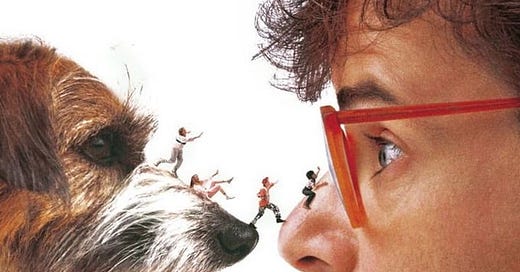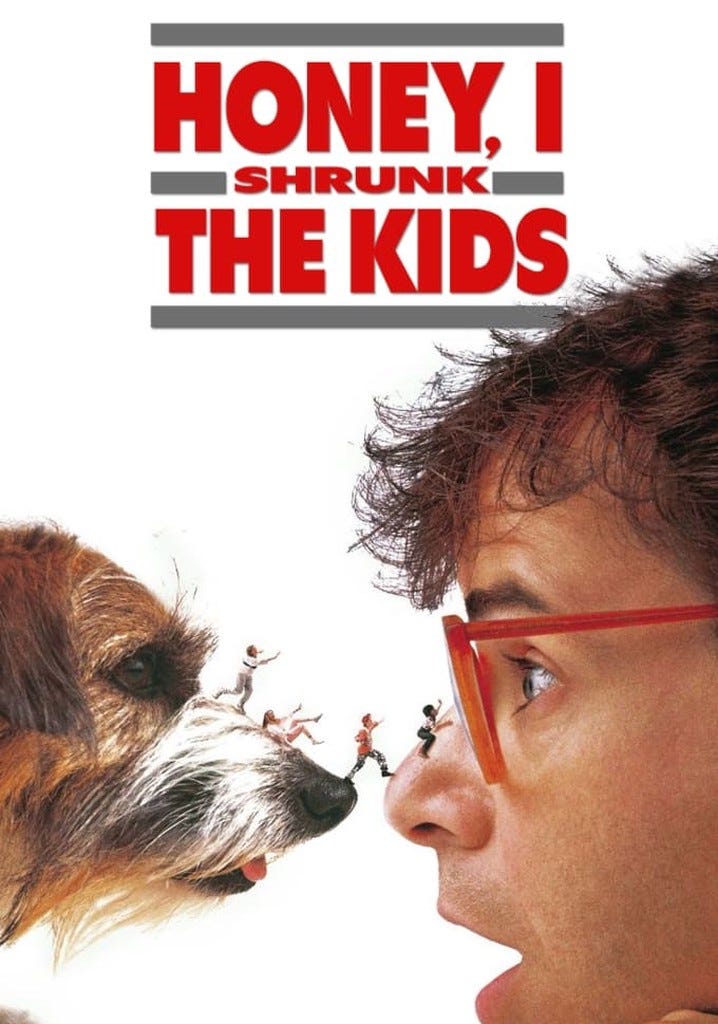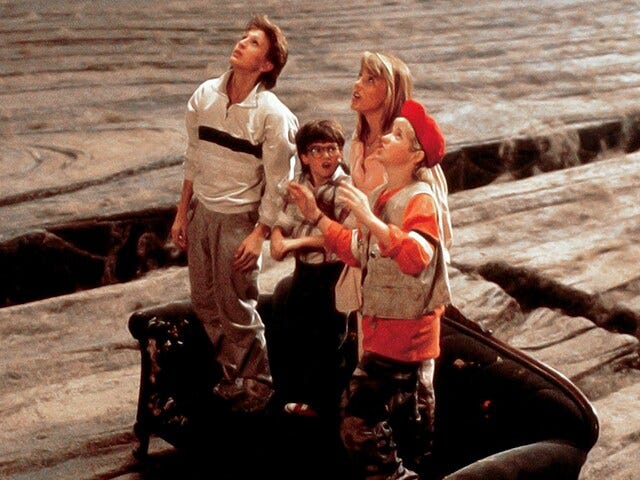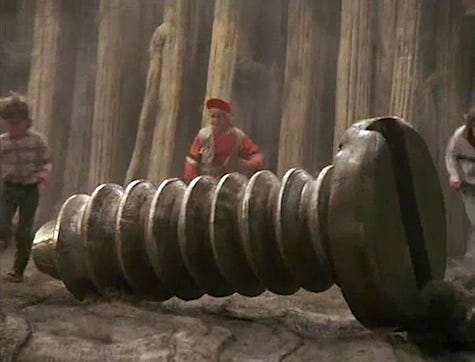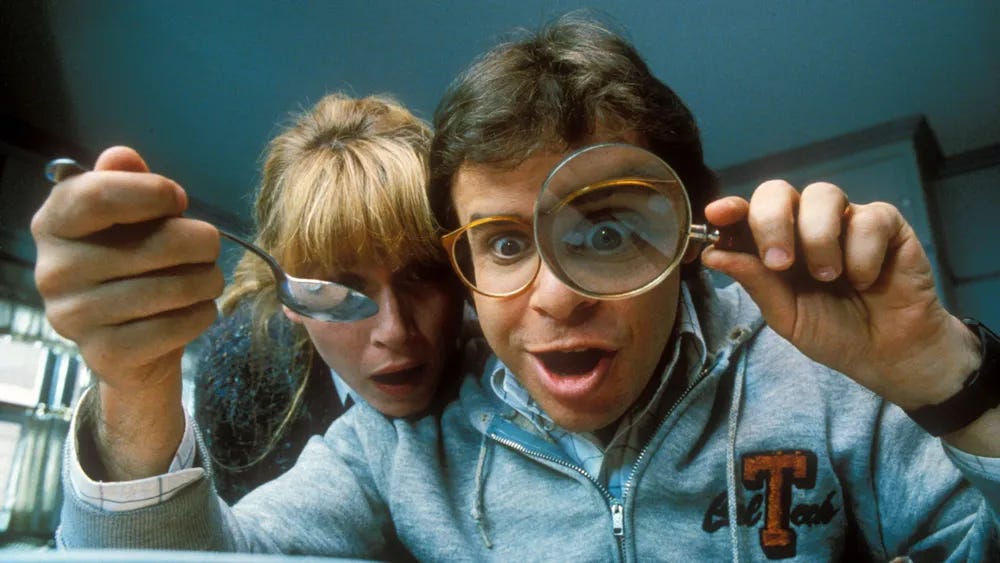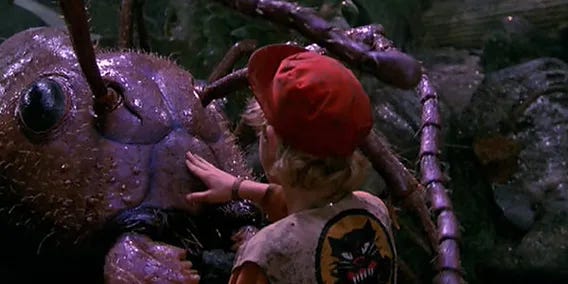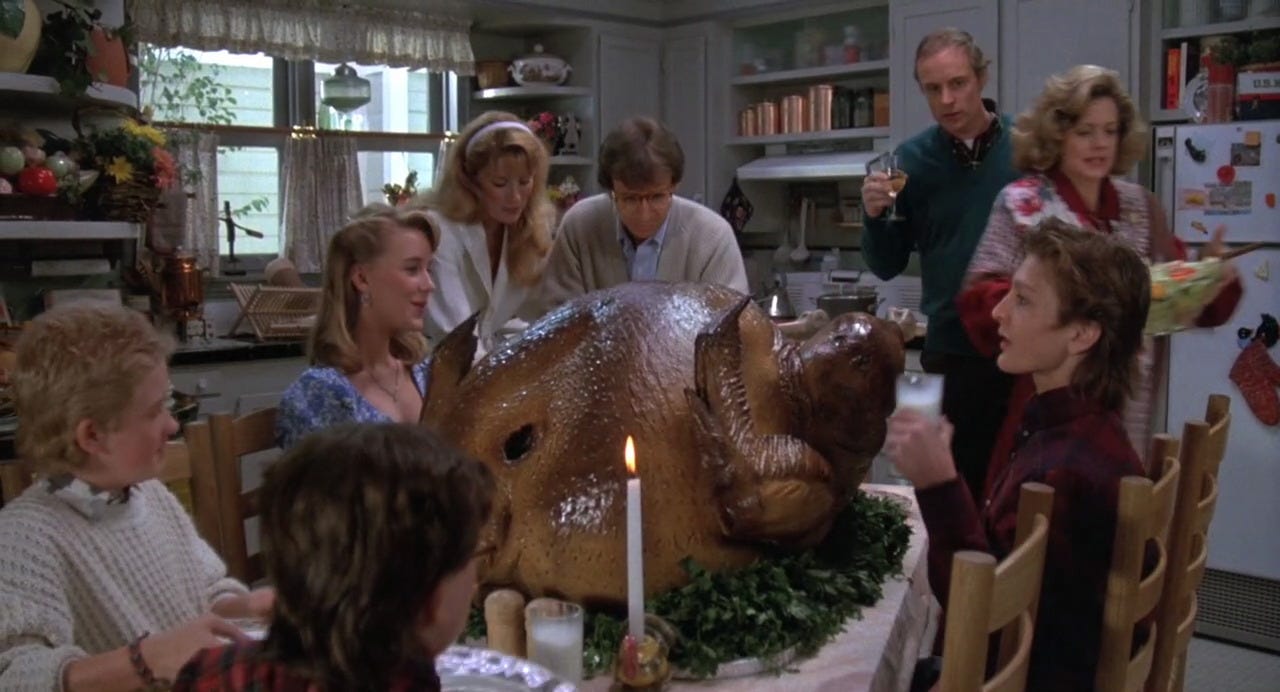In 1989, Honey, I Shrunk the Kids, directed by Joe Johnston, debuted as an instant classic, blending family comedy with science fiction. A story of innovation gone wrong, it became the first installment of a successful film franchise, marking Johnston's directorial debut. It was also a significant milestone for Walt Disney Pictures, reviving the studio during a financially uncertain period.
Walt Disney Pictures, founded in 1923, rose to global prominence through animated classics like Snow White and the Seven Dwarfs and Bambi. Disney: The First 100 Years by David Smith and Steven Clark explains how Walt Disney's visionary leadership revolutionized animation and storytelling. Disney's innovation extended to live-action films, with massive hits such as Old Yeller and The Love Bug enhancing the studio's reputation. Notably, 20,000 Leagues Under the Sea, released in 1954, was a technical marvel, blending visual effects and compelling adventure, influencing future science fiction narratives.
However, by the late 1980s, Disney struggled to regain cultural dominance. Disney’s World: A Biography by Leonard Mosley illustrates that the studio faced significant box office failures, with underperforming films like The Black Cauldron and Return to Oz in 1985. Disney’s struggles were compounded by leadership transitions and creative stagnation. According to The Magic Kingdom: Walt Disney and the American Way of Life by Steven Watts, the company found itself at a crossroads, needing to revitalize its live-action division. The creation of Honey, I Shrunk the Kids proved to be a pivotal moment in this revival.
The inspiration behind Honey, I Shrunk the Kids stemmed from a blend of science fiction tropes and family-oriented narratives, key staples of Disney's approach to storytelling. Originally conceived by Stuart Gordon, the film was shaped by the creative team of Joe Johnston, Ed Naha, and producer Penney Finkelman Cox. Johnston brought an imaginative vision and technical expertise to the project, having previously worked as a visual effects artist on Star Wars. This background allowed him to effectively handle the film’s blend of visual effects, humor, and emotional depth.
Set in a suburban neighborhood, the film follows Wayne Szalinski, portrayed by Rick Moranis, a quirky, well-meaning inventor whose shrinking machine accidentally reduces his two children, Amy (Amy O’Neill) and Nick (Robert Oliveri), along with their neighbors, Ron (Jared Rushton) and Russ Jr. (Thomas Wilson), to the size of ants. Lost in their backyard, the miniature quartet must navigate towering blades of grass, treacherous insects, and the looming danger of being overlooked by their oblivious parents. Though dangerous, the journey shows the strength of people working together and supporting family.
At its core, Honey, I Shrunk the Kids delivers a powerful socio-cultural message about the importance of family. The Szalinski and Thompson families are initially fractured: Wayne is absorbed in his work, distancing himself from his wife Diane, played by Marcia Strassman, and the Thompsons struggle with familial discord. Through their shared adventure, the film illustrates the healing power of unity. The scenes where the children work together to overcome immense dangers emphasize the necessity of collaboration, underscoring the theme that family bonds are strengthened through adversity.
The film also presents an optimistic view of science, tempered by caution. Wayne Szalinski’s shrinking machine represents the dual-edged sword of technological progress. While innovation holds immense potential, it also poses risks if mishandled. This tension echoes broader societal concerns during the 1980s, marked by rapid technological advancements and environmental worries. The film suggests that while curiosity and scientific exploration are vital, they must be grounded in responsibility—a lesson that resonates with audiences across generations.
Furthermore, Honey, I Shrunk the Kids explores the theme of danger, which parallels the anxieties of raising children in an unpredictable world. The parents’ panic upon realizing their children are missing mirrors the universal fear of losing control in parenting. However, the film posits that danger is an inevitable part of growth, and overcoming it builds character. As the children navigate difficult obstacles, they demonstrate resourcefulness, bravery, and the capacity for teamwork.
Justly, Honey, I Shrunk the Kids is full of moral lessons. Honesty is a recurring theme, particularly embodied in Wayne Szalinski’s character. When he realizes his invention has endangered his children, he takes full accountability for his actions. This sense of responsibility is crucial; rather than shying away from his mistake, Wayne actively works to fix the problem, demonstrating integrity and accountability. His perseverance reflects a broader ethical principle: even when innovation goes awry, one must take responsibility for the consequences. The children also exemplify ethical virtues throughout the film. Russ Thompson Jr., initially depicted as a detached older brother, grows into a compassionate and loyal leader. His willingness to protect his younger brother, Ron, despite their sibling rivalry, highlights the ethical principle of loyalty and responsibility. This transformation underscores the importance of moral growth in times of crisis. Similarly, Nick Szalinski, the youngest, brings honesty and curiosity, which ultimately help the group survive.
The success of Honey, I Shrunk the Kids is largely attributed to its strong ensemble cast. Rick Moranis shines as Wayne Szalinski, perfectly balancing the role of a well-meaning but bumbling inventor. Moranis’ comedic timing is impeccable, but it’s his emotional depth—particularly in scenes where he confronts the danger, he’s inadvertently placed his children in—that makes his performance memorable. Marcia Strassman, as Diane Szalinski, brings warmth and strength to her role, portraying a mother who embodies resilience and compassion. The younger cast members, including Amy O'Neill, Robert Oliveri, and Jared Rushton, deliver standout performances. O'Neill's portrayal of Amy Szalinski is layered with emotional nuance, as she transitions from a typical teenager to a capable leader. Rushton, as Ron Thompson, brings energy and humor to the role, making his character's growth more compelling. These performances, combined with Joe Johnston’s direction, contribute to the film’s enduring appeal.
Upon its release, Honey, I Shrunk the Kids was a commercial triumph, grossing over $222 million worldwide on a modest budget. The film's success breathed new life into Disney's live-action division, which had faced challenges throughout the 1980s. Critics, including those from The New York Times, praised the film for its inventive premise and heartwarming narrative. The film’s success also sparked a franchise, including sequels like Honey, I Blew Up the Kid, released in 1992, and Honey, We Shrunk Ourselves, released in 1997. Merchandise such as action figures, board games, and a Disneyland attraction further solidified its place in Disney’s live-action catalog.
Some might argue that Honey, I Shrunk the Kids is a fun family adventure without deeper sociocultural or ethical messages. After all, it is a lighthearted comedy filled with fantastical elements. However, dismissing the film as mere entertainment overlooks its nuanced exploration of family dynamics, ethical responsibilities, and the societal implications of unchecked scientific progress. Beneath the humor and visual spectacle lies a narrative rich with moral and cultural significance, making it much more than just a family comedy.
Thirty-five years after its release, Honey, I Shrunk the Kids remains a beloved film with enduring cultural relevance. Later Disney live-action movies like The Mighty Ducks, Cool Runnings, and Pirates of the Caribbean followed its winning formula of mixing adventure with comedy and emotional depth. The film’s success also paved the way for other family-friendly science fiction comedies, helping to expand the boundaries of what live-action family films could achieve. Moreover, the film’s legacy is reflected in its continued high ratings on platforms like Rotten Tomatoes, where it holds an impressive score. Its balance of special effects, heartfelt performances, and ethical depth have ensured its place in cinematic history, influencing a new generation of filmmakers and audiences.
Honey, I Shrunk the Kids transcends pure entertainment through its masterful blend of family dynamics and scientific adventure. As Wayne Szalinski's experiment goes awry, the film weaves together themes of honesty and accountability, showing how family unity becomes crucial for survival while warning about the weighty consequences of unchecked scientific ambition. Thirty-five years later, its messages remain relevant.

